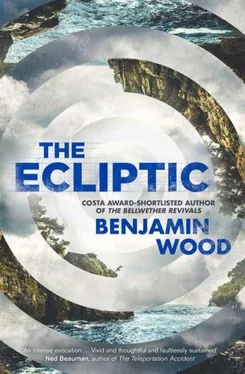‘ Kiz goo-loo, helleh helleh goo-loo . .’
It was in a decent state, soggy but not ruined. The photo page fell open in my hand. There he was again: the real Fullerton. British citizen. He did not seem any younger in the photo. His lank hair was the same but his face was studded with acne. Surname: scratched out. Given names: scratched out. Date of birth: deep laceration. I dropped him in my satchel and withdrew into the trees.
Preserving The Ecliptic was a wearying endeavour. Each issue had to be unpicked from its staples, hand-squeezed of moisture with a rubber print-roller on a cotton towel, then hung on a string across my studio. I did not know a simpler way of doing it. Many of the pages were too damaged to rescue. They stuck and tore as I tried to part them, or bled most of their ink into the towel as I dried them. I lost whole sections to careless mistakes with the roller: too much pressure buckled the paper, shards of grit got caught up in the rubber and shredded several panels, front and back. Issues 2, 4, and 6 were too warped to read, their pictures washed out or occluded. Most of Issue 5 ripped in my hands as I unpicked it. By the time I had finished all this conservation work, I felt sapped of energy. At least a hundred pages hung on the lines above my head, stretched from every corner of my studio. I fell onto my bed, into the deepest sleep I ever earned.
Daylight brought no change to the foul weather. I rose cold and stiff, and stood drinking weak tea in my thermals until the shower ran hot enough to bathe. The fragrance of damp ground was all about the studio, and the stove-smoke only seemed to worsen it. I had the urge to put on the boy’s striped sweater — it looked so worn and comfortable — but kept to my normal painting clothes instead. Who knew what time it was? I had not heard the breakfast bell or any distant calls to prayer, but I had woken with a queasy sense of urgency.
Bringing down the boy’s pages from the lines, reassembling the issues, I was overtaken with excitement. The moody covers lured me in. I could not remember the last time I had been so absorbed by someone else’s work.
I had managed to save just two complete issues—#1 and #3—but most of the front covers were still intact. They were logoed with a kind of origami swan at the top right of the page: CYGNUS COMICS. In each of the cover illustrations, the main character grew a fraction older, shown in various states of distress: submerged in a petrol tank, crawling through an air duct, trapped behind a porthole, clutching sticks of dynamite and other weapons.
The cover of #1 showed the character in half-light, dangling from a gantry. He was hanging over a vast metallic chasm by the fingers of one hand and it seemed certain he would drop. I was transfixed by the determination in his face, the glint of vengeance in his eyes. I felt just like him: about to plunge into a world of the boy’s making. And I did — I fell. I devoured the whole issue and the next.
Issue 1 — G Deck
AT COORDINATES UNKNOWN. . (They all seemed to open with these words, top left). Inside the dank and rusted chamber of what appears to be a ship, a young man is slumped, unconscious, shackled by the wrists to a steel pillar. A voice fizzes out from a loudspeaker above his head (in spiky word balloons): Passenger announcement! Children on B Deck must be accompanied by their guardians at all times. His eyes slowly creak open, and he seems woozy and disoriented. Repeat: all children on B Deck must be accompanied— He feels a sudden pain in his mouth. A tiny key is lodged underneath his tongue and he spits it out into his hand, unlocks the cuffs. His wrists are chafed and raw.
The angle widens. He is alone and naked in a room containing two generators, oxidised and derelict. There is a smoky auburn light, a metal locker, and a steel hatchway with a reinforced door. He goes to the locker and removes a leather suitcase containing personal effects: a Bible, a hipflask, a Bowie knife, a wristwatch. Hanging in the locker is a set of blue overalls, streaked with oil. The name-badge on the breast says: IRFAN TOL, 4TH ENGINEER, and stencilled on the back in white is the phrase: DV-ECLIPTIC.
Cut to a dark corridor. The man finds his way into a cargo hold where hundreds of giant wooden crates are stacked. He crowbars the lids from three of them, discovering a hoard of taxidermy, furniture, paintings, boxes of cigarettes (he pockets several packs) and tins of crabmeat (he stabs one open and drains the juice). The announcements continue on the loudspeakers: This is a notice for all passengers in first-class. The totaliser on the ship’s run will be announced at 11.00 hours on the Promenade Deck Square. The totaliser will be announced at 11.00 hours on the Promenade Deck Square. Thank you. But his watch says it is 3.15 already — a.m. or p.m.? He is not sure.
The man believes he is alone (he says so aloud, in a word balloon). There is no daylight, just flickering bulbs (a greenish hue to the panels throughout this section) and he climbs the crates to get a view of what is below him, reaching a gantry. His thoughts are shown to us in slanting words: he thinks the ship is moving, but he cannot hear the engines (his words: the powertrain ). There are no doors. The space below is dark. The walls are gently leaking. He slips and, dangling from the railing of the gantry (reprise of the cover image here), notices something: a sway of shadows in the hold below. Dropping down onto a crate and leaping to another, he follows the shadow, but it recoils. He loses it.
Descending to the floor, he side-steps between a maze of crates. At the far end of the hold, there is a line of candelabras, coiled with Christmas lights, that leads into a sort of glade amongst the cargo. He is surprised to find an old woman sitting in an armchair, playing chess with nobody. She holds a finger to her lips and shushes him, moves her queen upon the board. The Christmas lights are wired up to a cable conduit on the wall behind her.
The woman has made quite a life for herself in the cargo hold, living off the salvage. She is adorned in a fur coat with a collar of mink-heads, and wears so much jewellery that she gives the impression of a Pharaoh on a throne. ‘I knew somebody would come for me,’ she says. ‘I knew it would happen eventually.’ And she offers the man a cup of vinegar. He raises his hipflask and she says, ‘Oh, even better.’ But, as he leans down to pour the liquor into her cup, she points a pistol at him. ‘I’m not going to let you take me,’ she says. ‘I have it too good here.’ There is a tussle — the man lunges forwards; she shoots and misses; he overpowers her. And now holding the pistol at the woman, he forces her back against a crate. All he wants to know, he says, is where he is, and how to get out.
And so she explains it all to him (in that way that villains do in films, always wanting to reveal the lengths of their true evil). ‘This,’ she tells him, ‘is what they call a dead vessel. You’re on a ship that’s been retired from navigation, sonny. Listen—’ She points to the air. ‘No engine noise. But what’s funny about that is you can feel it moving, can’t you? And you’d be right, because we are. We’re going somewhere all right. So if you want to know where in the world the two of us are standing at this moment, my answer is: anywhere, everywhere. Who the hell can say? You’re on the Ecliptic and there’s no way off it, not that I’ve ever found. So I’d get used to this place, shipmate, if I were you—’ (squinting) ‘—Irfan.’
‘That’s not my name,’ he says.
‘Your badge says otherwise.’
‘Irfan Tol is not my name.’
‘What makes you so sure?’
Читать дальше












